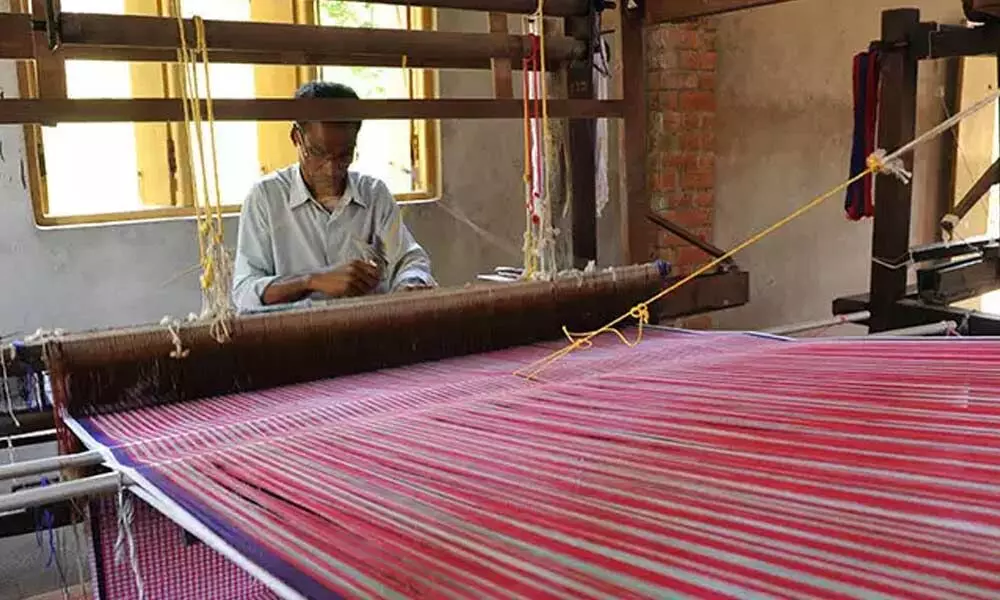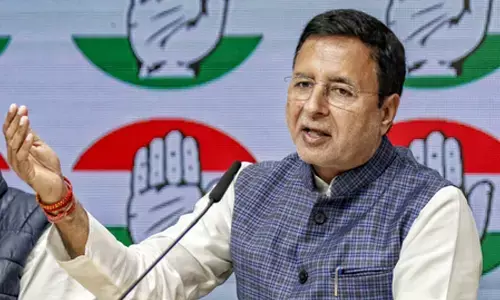Chirala: Centre urged to save handlooms, handicrafts

Centre urged to save handlooms, handicrafts
Decision to abolish National Handloom Board and National Handicrafts Board decried
Chirala: The National Federation for Handlooms and Handicrafts (NFFH) organised a virtual press conference with representatives from weaving and artisan communities from across the country, including Macherla Mohan Rao, the president of NFFH from Chirala in AP.
The speakers highlighted the importance of the sector which is second only to agriculture in employment generation in the country. They articulated the need to look at the handlooms and handicrafts sector as not just a niche market but as a traditional livelihood source which contributed significantly to the national development whether through exports or domestic market consumption.
Almost all representatives brought attention to the declining budgetary allocations to the handlooms and handicrafts sector for the last 5 years. They pointed to the apathy of the government to the situation of the weavers and the artisans.
Jaya Jaitley from Dastkar Haat Samithi, Delhi, pointed out that textiles and craft can be connected with almost any industry, thereby ensuring mass demand from the public sector itself e.g. railways or health sector, but the political will is always lacking. Sonam Gyalastein from Sikkim echoed the need to create local demand for the products and thereby ensuring that there is always a local market to ensure the sustainability of the weavers and artisans.
Sivakumar from Trivandrum in Kerala highlighted the Kerala government's efforts at ensuring that the handloom cooperatives which account for almost 60 % of weavers' engagement in Kerala are supported through government's orders. Following the pandemic, the situation has worsened further by lack of demand in the market as pointed out by Nihar Ranjan Kalitha from Saulukuchi, Assam. He also mentioned that loans under the financial package created as Covid relief have not been accessible to weavers in Assam, where citing one reason or another, they have been denied by banks.
Arup Rakshit of the M G Gramodyog Seva Santhan Foundation spoke about the dire situation of the weavers working on khadi products citing that 174 societies in West Bengal were unable to provide work to their weavers for many months now. He said that apart from the 5 kg rice through the BPL cards, there is no support for these weavers from the Centre or State.
Belaa Sanghvi from Mumbai mentioned that India is home to the largest skill sets of weavers and artisans in the world and it needs to be treated as a world heritage. She also highlighted the need for the community to be more cohesive.
Desu Suresh and Tadaka Yadagiri from Telangana also stressed this aspect of collective bargaining power. He insisted that the power loom as such is not a threat to the handloom sector if there is strict oversight to prevent power loom products being sold as handloom which is the case in India.
Macherla Mohan Rao from Andhra said that despite the National Handloom Board and National Handicrafts Board being less active in the last many years, nonetheless, they were the voice of the weavers and artisans. The abolishing of these Boards by the Central government is the latest in the clear indication of the government absolving itself of its role as a welfare state.
The speakers opined that the government's non-collaborative nature in deciding what is good for the community and the sector was highlighted as consistent problems.
The National Federation of Handlooms and Handicrafts also gave a call for a peaceful struggle as the only way forward if the government continues to act with apathy to the situation of the weavers and artisans.











